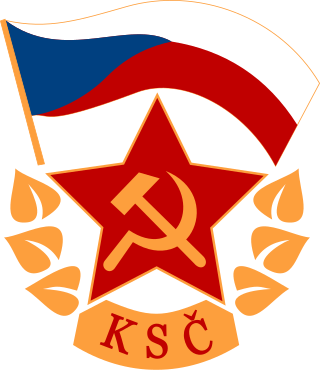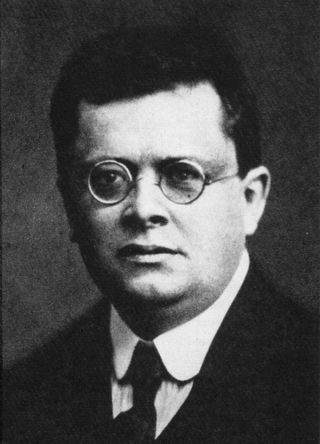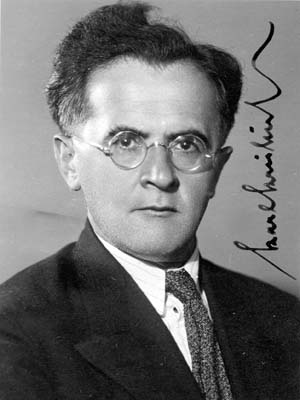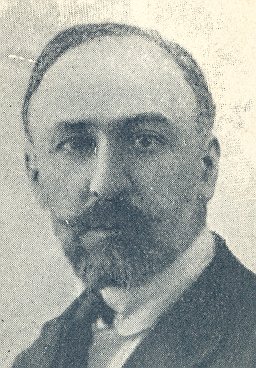Related Research Articles

Klement Gottwald was a Czech communist politician, who was the leader of the Communist Party of Czechoslovakia from 1929 until his death in 1953 – titled as general secretary until 1945 and as chairman from 1945 to 1953. He was the first leader of Communist Czechoslovakia from 1948 to 1953.

The Communist International (Comintern), also known as the Third International, was an international organization founded in 1919 that advocated world communism, and which was led and controlled by the Communist Party of the Soviet Union. The Comintern resolved at its Second Congress in 1920 to "struggle by all available means, including armed force, for the overthrow of the international bourgeoisie and the creation of an international soviet republic as a transition stage to the complete abolition of the state". The Comintern was preceded by the dissolution of the Second International in 1916.

The Communist Party of Czechoslovakia was a communist and Marxist–Leninist political party in Czechoslovakia that existed between 1921 and 1992. It was a member of the Comintern. Between 1929 and 1953, it was led by Klement Gottwald. The KSČ was the sole governing party in the Czechoslovak Socialist Republic though it was a leading party along with the Slovak branch and four other legally permitted non-communist parties. After its election victory in 1946, it seized power in the 1948 Czechoslovak coup d'état and established a one-party state allied with the Soviet Union. Nationalization of virtually all private enterprises followed, and a command economy was implemented.

Antonín Zápotocký was a Czech communist politician and statesman who served as the prime minister of Czechoslovakia from 1948 to 1953 and the president of Czechoslovakia from 1953 to 1957.

Antonín Josef Novotný was a Czechoslovak politician, known as the president of Czechoslovakia from 1957 to 1968. He was First Secretary of the Communist Party of Czechoslovakia from 1953 to 1968. An ardent hardliner, Novotný was forced to yield the reins of power to Alexander Dubček during the short-lived reform movement of 1968.
The Right Opposition or Right Tendency in the All-Union Communist Party (Bolsheviks) was a conditional label formulated by Joseph Stalin in autumn of 1928 in regards to the opposition against certain measures included within the first five-year plan, an opposition which was led by Nikolai Bukharin, Alexei Rykov, Mikhail Tomsky and their supporters within the Soviet Union that did not follow the so called "general line of the party". It is also the name given to "right-wing" critics within the Communist movement internationally, particularly those who coalesced in the International Communist Opposition, regardless of whether they identified with Bukharin and Rykov.

Czech National Social Party is a civic nationalist political party in the Czech Republic, that once played an important role in Czechoslovakia during the interwar period. It was established in 1897 by break-away groups from both the national liberal Young Czech Party and the Czech Social Democratic Party, with a stress on achieving independence of the Czech lands from Austria-Hungary. Its variant of socialism was moderate and reformist rather than a Marxist one. After the National Labour Party dissolved and merged with National Socialists in 1930, the party also became the refuge for Czech liberals. Its best-known member was Edvard Beneš, a co-founder of Czechoslovakia and the country's second President during the 1930s and 1940s.

Bohumír Šmeral was a Czech politician, leader of the Czech Social Democratic Party, and one of the founders of the Communist Party of Czechoslovakia.

The German Social Democratic Workers' Party in the Czechoslovak Republic was a German social democratic party in Czechoslovakia, founded when the Bohemian provincial organization of the Social Democratic Workers' Party of Austria separated itself from the mother party. The founding convention was held in Teplice from 30 August – 3 September 1919; the first leader of the party was Josef Seliger.
The Socialist Party of Romania was a Romanian socialist political party, created on December 11, 1918 by members of the Social Democratic Party of Romania (PSDR), after the latter emerged from clandestinity. Through its PSDR legacy, the PS maintained a close connection with the local labor movement and was symbolically linked to the first local socialist group, the Romanian Social-Democratic Workers' Party. Its creation coincided with the establishment of Greater Romania in the wake of World War I; after May 1919, it began a process of fusion with the social democratic groups of in the former territories of Austria-Hungary — the Social Democratic Parties of Transylvania, Banat and Bukovina. The parties adopted a common platform in October 1920. Progressively influenced by Leninism, the PS became divided between a maximalist majority supporting Bolshevik guidelines and a reformist-minded minority: the former affiliated with the Comintern as the Socialist-Communist Party in May 1921, while the minority eventually established a new Romanian Social Democratic Party.

The Marxist Left in Slovakia and the Transcarpathian Ukraine was a political organisation in eastern parts of the First Czechoslovak Republic. It was one of the forerunners of the Communist Party of Czechoslovakia.
Heinrich Brandler was a German communist, trade unionist, politician, revolutionary activist, and political writer. Brandler is best remembered as the head of the Communist Party of Germany (KPD) during the party's ill-fated "March Action" of 1921 and aborted uprising of 1923, for which he was held responsible by the Communist International. Expelled from the Communist Party in December 1928, Brandler went on to become co-founder of the Communist Party of Germany Opposition, the first national section of the so-called International Right Opposition.

Polish Socialist Workers Party was a political party in Czechoslovakia founded in February 1921, based amongst Polish workers. The party was active in trade union struggles, mainly mobilizing miners and workers in heavy industries. The chairman of the party was Emanuel Chobot. Other prominent members of the party were Antoni Steffek and Wiktor Sembol. The party closely cooperated with the Czechoslovak Social Democratic Party. The party published the newspaper Robotnik Śląski from Fryštát.
Ghiță Moscu was a Romanian socialist and communist activist, one of the early leaders of the Romanian Communist Party and its permanent delegate to the Third International. He was executed in the Soviet Union during the Great Purge.

Milan Gorkić, born as Josef Čižinský, was a high-ranking and prominent Yugoslav communist politician and activist. He was the General Secretary of the Communist Party of Yugoslavia (KPJ) in exile from 1932 until 1937 and also a prominent member of the Comintern.
The Communist Party of Czechoslovakia, Section of the Communist International was a communist party in Czechoslovakia. The party emerged from a split in the German labour movement in the Czechoslovak Republic and functioned parallel to the Czech Marxist left movement for most of 1921. The party represented a more radical position compared to the Czech Marxist left, and fully supported adherence to the Communist International. It eventually merged into the Communist Party of Czechoslovakia.
The Union of Communist Groups was a communist organization in Czechoslovakia, led by Stanislav Kostka Neumann.

Karl Kreibich, also known as Karel Kreibich, was a Sudeten German communist politician and author in Czechoslovakia. Kreibich emerged as the main leader of the revolutionary socialist movement amongst German workers in Bohemia after the First World War. He was a leader of the Communist Party of Czechoslovakia and a functionary of the Communist International. During the First Czechoslovak Republic, he was elected to parliament thrice. During the Second World War he was part of the exiled Czechoslovak State Council, based in London. After the war he served as Czechoslovak ambassador to the Soviet Union.
The International Socialist Party of Subcarpathian Rus' was a political party in Subcarpathian Rus', eastern Czechoslovakia. The party was formed in March 1920, by supporters of the now defeated Hungarian Soviet Republic and prisoners of war having returned from Soviet Russia. The party was one of the forerunners of the Communist Party of Czechoslovakia.

Egidio Gennari was an Italian communist politician who was among the founders of Italian Communist Party. He served at the Italian Parliament between 1924 and 1926 when he was forced to leave Italy due to the repression of the Fascist government. He died in exile in the Soviet Union.